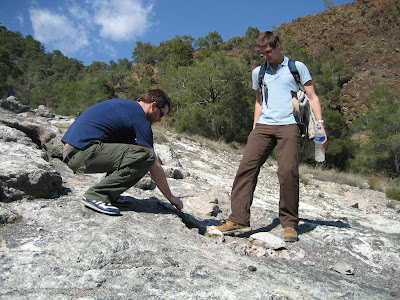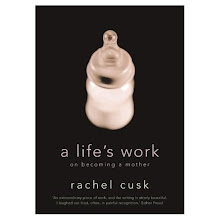 Syria is a land of contradictions. While the government heavily censors web access (Facebook is banned, as is Blogger but I've managed to break through via Mozilla Firefox) the streets around Aleppo - the country's second largest city - are littered with lingerie stores selling an array of neon coloured undergarments that would put Amsterdam's Red Light district to shame. Every house, flat or shop boasts a satellite dish - Aleppo from the air resembling a pock-marked teenager - with said-satellite television offering more than a hundred (graphic) Arabic porn channels. And yet of the few women seemingly granted 'street privileges,' all are covered from head to toe in floor-length overcoats and veiled burkas that shroud even their eyes from view. So just who is wearing the lime green knickers?
Syria is a land of contradictions. While the government heavily censors web access (Facebook is banned, as is Blogger but I've managed to break through via Mozilla Firefox) the streets around Aleppo - the country's second largest city - are littered with lingerie stores selling an array of neon coloured undergarments that would put Amsterdam's Red Light district to shame. Every house, flat or shop boasts a satellite dish - Aleppo from the air resembling a pock-marked teenager - with said-satellite television offering more than a hundred (graphic) Arabic porn channels. And yet of the few women seemingly granted 'street privileges,' all are covered from head to toe in floor-length overcoats and veiled burkas that shroud even their eyes from view. So just who is wearing the lime green knickers?Crossing the border on Thursday - border control yet another example of Middle Eastern inefficiency where no fewer than six men are employed to do the work of one, as another half dozen look on smoking cigarettes and sipping tea - we spent the afternoon roaming through the souks. After buying a small child's weight in scarves, Boyfriend dragged me out of the musty, smelly mayhem (where lamb carcases hang in the open air next to stalls selling dried fruit, nuts and sweating cheeses) and back to our hotel.
On Friday, Islam's day of rest, we walked the deserted streets to the historic citadel. Aleppo is another city claiming the title of 'oldest inhabited city'; it's citadel a testament to the notion that at one time, the city was in fact quite grand. The hill, on which the ruins of a fortified medieval palace (c.1100 CE) now stand, is claimed to date back to the 3rd century BC. Sadly restoration of the site has slowed to a near standstill. The ruins reek of urine and the pathways and remains lay covered in people's rubbish. With most of the visitors local Syrians - we were among perhaps a handful of Westerners visiting with the masses - it's hard not to chastise the locals for their lack of pride in their great city's monument.
 Looking out over the high limestone walls, across the great expanse of Aleppo - the city spanning 16,000 km² with a population just under 5 million - our 360 degree view was bleak. Searching for areas of vegetation left us wanting, with the only dots of green the patches of dying grass amid decaying buildings. It seems that repair and restoration is an unfamiliar concept to 'modern' Middle Easterners. Decrepit buildings are simply propped up with wooden sticks and new constructions are left incomplete to avoid paying the full amount of home owner tax. Even the 'grand' government building at the base of citadel hill had broken windows and debris spilling out into it's courtyard.
Looking out over the high limestone walls, across the great expanse of Aleppo - the city spanning 16,000 km² with a population just under 5 million - our 360 degree view was bleak. Searching for areas of vegetation left us wanting, with the only dots of green the patches of dying grass amid decaying buildings. It seems that repair and restoration is an unfamiliar concept to 'modern' Middle Easterners. Decrepit buildings are simply propped up with wooden sticks and new constructions are left incomplete to avoid paying the full amount of home owner tax. Even the 'grand' government building at the base of citadel hill had broken windows and debris spilling out into it's courtyard.It baffles the mind as to how the same region that founded the civilised world, where impressive structures were built to stand the test of thousands of years, can now be so backward. Dust and dirt is everywhere and no one seems the least bit concerned. Travelling through India, Peru and even parts of South East Asia I found the same, poor people living amongst their own squalor. It costs nothing to pick up the rubbish strewn over your own balcony, roof top and outside your own front door - nothing except time; and time is certainly something the people seem to have in abundance.
Sorry, but my (independent/liberated/Western) female mind can't help but judge.
Note: Top pic courtesy of Bugbog.com, rooftops thanks to Flickr.com

 Speaking no English, they shooed Chloe and I through to a marble changing room (complete with wooden cubicles and the odd Turkish rug), where we donned our bathers and flip flops, and led us by the hand through a doorway fit for hobbits and into the first of our washrooms.
Speaking no English, they shooed Chloe and I through to a marble changing room (complete with wooden cubicles and the odd Turkish rug), where we donned our bathers and flip flops, and led us by the hand through a doorway fit for hobbits and into the first of our washrooms.




 While the flames were little, the boys were able to amuse both themselves and others by dousing the fires with water and reigniting them using various sticks and dried grasses they found. This activity wore on for a good hour or so before Chloe and I dragged them back down. Although the fact that two tour buses had arrived with others wanting to play with the flames helped our cause.
While the flames were little, the boys were able to amuse both themselves and others by dousing the fires with water and reigniting them using various sticks and dried grasses they found. This activity wore on for a good hour or so before Chloe and I dragged them back down. Although the fact that two tour buses had arrived with others wanting to play with the flames helped our cause.



 Praise Allah, one of his handy followers was onboard and he hopped out to help the driver put on some snow chains. At one point the bus started to slide a bit and our guide, Chloe, jumped up to reapply the handbrake. Crisis averted, it was still enough to shock us all with visions of ourselves being thrown, cocktail shaker-like, headfirst off the cliff.
Praise Allah, one of his handy followers was onboard and he hopped out to help the driver put on some snow chains. At one point the bus started to slide a bit and our guide, Chloe, jumped up to reapply the handbrake. Crisis averted, it was still enough to shock us all with visions of ourselves being thrown, cocktail shaker-like, headfirst off the cliff. Amid the excitement I managed to take a few more snaps. Later when Our Saviour took his exit he handed me his card as he mumbled something in Turkish. I turned and looked quizzically at a young guy who I hoped might speak some English; he reassured me that the man was simply asking for me to send him a copy of the photos I’d taken – not propositioning me for wifedom. I flourished a smile and a thumbs-up in agreement. After all, without his help we’d likely still be snowed-in atop a mountain!
Amid the excitement I managed to take a few more snaps. Later when Our Saviour took his exit he handed me his card as he mumbled something in Turkish. I turned and looked quizzically at a young guy who I hoped might speak some English; he reassured me that the man was simply asking for me to send him a copy of the photos I’d taken – not propositioning me for wifedom. I flourished a smile and a thumbs-up in agreement. After all, without his help we’d likely still be snowed-in atop a mountain!
















 This guy not only addressed me personally – as I was snapping away at his sardines and sea breams – but he seemed genuinely interested in what I had to say: I was putty in his hands. It turned out that Garip’s uncle had immigrated to Melbourne 45 years ago (Garip even scrolled through his mobile address book to show said-uncle’s Australian phone number) and had recently flown back to Turkey to visit Garip’s dying father. In less than five minutes we’d learned all about his family and shared tales of both the joys and sadness that come with immigration (me regaling my mother’s own story of moving over from Slovenia). So of course I promised that we’d return for dinner that evening and bring our new tour group. Happily envisaging his prospective table-of-eight, Garip continued to wave to us from across the caddesi as we made our way back up the hill into the city.
This guy not only addressed me personally – as I was snapping away at his sardines and sea breams – but he seemed genuinely interested in what I had to say: I was putty in his hands. It turned out that Garip’s uncle had immigrated to Melbourne 45 years ago (Garip even scrolled through his mobile address book to show said-uncle’s Australian phone number) and had recently flown back to Turkey to visit Garip’s dying father. In less than five minutes we’d learned all about his family and shared tales of both the joys and sadness that come with immigration (me regaling my mother’s own story of moving over from Slovenia). So of course I promised that we’d return for dinner that evening and bring our new tour group. Happily envisaging his prospective table-of-eight, Garip continued to wave to us from across the caddesi as we made our way back up the hill into the city. We were feeling decidedly used as we arrived back to our hotel ready to meet our new tour group. We went to our room to gather our things, including our local payment money for our guide, and convened with our group in the lobby. It was then that Boyfriend realised we’d been robbed. While we had gone to the trouble of putting our wallets and passports in the hotel safe, Boyfriend had forgotten about the American dollars we’d had converted for the tour – that $880 he’d kept in his travel pouch tucked into the bottom of his daypack. It turns out that morning our cleaning lady had down more than simply make our bed and change our towels, she’d helped herself to $160! Of course the guy at reception denied any hotel staff involvement, but Boyfriend, being even more anally retentive than myself had noticed that the travel pouch had not only been moved but that the sheets of paper within the pouch had also been put back in a different order.
We were feeling decidedly used as we arrived back to our hotel ready to meet our new tour group. We went to our room to gather our things, including our local payment money for our guide, and convened with our group in the lobby. It was then that Boyfriend realised we’d been robbed. While we had gone to the trouble of putting our wallets and passports in the hotel safe, Boyfriend had forgotten about the American dollars we’d had converted for the tour – that $880 he’d kept in his travel pouch tucked into the bottom of his daypack. It turns out that morning our cleaning lady had down more than simply make our bed and change our towels, she’d helped herself to $160! Of course the guy at reception denied any hotel staff involvement, but Boyfriend, being even more anally retentive than myself had noticed that the travel pouch had not only been moved but that the sheets of paper within the pouch had also been put back in a different order.











































